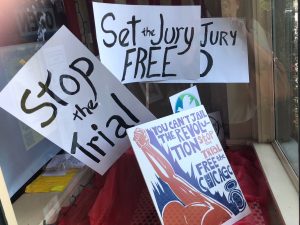
Posters from the Chicago 7 protests.
The Democratic National Convention in August 1968 brought protesters and politicians into conflict over American ideals and policy. Several of the most infamous demonstrators, the Chicago 7, stood trial in late 1968 for their theatrical protest and possible lawbreaking. One local woman, Jean Fritz, participated on the jury. Her journals are a “unique testament to a unique moment in American history. They are also the record of one woman’s struggle with the ideas of justice, democracy and her own role as a citizen” (Chicago Tribune).
The public can access the court transcripts from the Chicago 7 trial. But the real value of Jean Fritz’s journals are in the perspective they offer. Not just their insight into the events of the trial, but on how the case served as a kind of microcosm of the ideological and generational clashes that were happening in the U.S. during the period. The conservative, “big brother” elements came into conflict with the oppositely radical, counter-culture movement. Fritz sat somewhere in the middle of all of this, as an “average” American: a mother and homemaker from a moderate sized community, rather removed from the riots. Like most Americans and residents of the Chicagoland region, she was likely aware of the events surrounding the National Convention through the newspaper and television. As a juror, Fritz suddenly found herself thrust into a unique position where she became, over the course of the trial, a frontline witness to this clash. What she sees and hears caused her to think more deeply about the state of the country and the progression of society. She saw the concerns, merits, and problems, with each group’s ideas. Fritz wrestled with the tension of figuring out how she felt and thought about all of it; all the while, she dealt with the strain of being sequestered away from her family and home.
These journals are rich with opportunity. Scholars can now examine the trial from a previously unexplored perspective. Authors and moviemakers have produced numerous books and films based on both the court transcripts and the reflections of the defendants and key witnesses. However, until now, there has not been an examination of the jurors and their experiences. There are many ways to learn about this historic event and the key figures involved. In these journals, Fritz represents the sentiments of the many Americans who were less directly involved the ideological conflict of the period. It is an opportunity to understand just how impactful the actions and rhetoric of the so-called movers and shakers were in convincing their fellow citizens of the rightness of their causes.

The Edgewater Historical Society.
You can read more about Fritz’s journals in the Chicago Tribune article from August 25, 2018.
Kate is a former Graduate Assistant of the WLA and graduated in 2018 with her M.A. in Public History from Loyola University Chicago. A Colorado gal, she recently returned to her home state and began an archives position at the University of Northern Colorado. She enjoys classic films, bike riding, and all things museums.
Loyola University Chicago’s Women and Leadership Archives Blog is designed to provide a positive environment for the Loyola community to discuss important issues and ideas. Differences of opinion are encouraged. We invite comments in response to posts and ask that you write in a civil and respectful manner. All comments will be screened for tone and content and must include the first and last name of the author and a valid email address. The appearance of comments on the blog does not imply the University’s endorsement or acceptance of views expressed.
